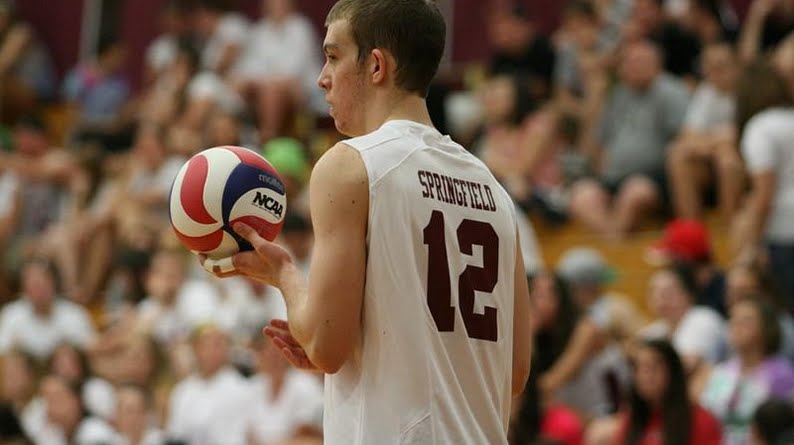Keaton Pieper is an Out, Proud, National Volleyball Champion at Springfield College

Keaton Pieper is a Junior at Springfield College studying Finance and Marketing. A middle child with an older and younger sister, he’s the son of Lisa and Jeff Pieper. Born in Kansas City, MO, he later moved to Dayton, OH where he attended high school at Archbishop Alter High School. Keaton comes from a Roman Catholic family and has loved sports since he was young, playing basketball and baseball before trying volleyball in 7th grade. Read more about his story below.
Q: When did you come out?
A: I came out to my family the August of 2012 before my sophomore year of college. They were awesome. It was very emotional and I’m not sure I was quite ready to tell them, but we were all together and that rarely happens and I wanted to tell them all at the same time. They were very accepting right away and assured me of their support immediately.
I came out publicly to my team and the Springfield community this fall. My team has been very supportive. It was definitely harder for some of them, but I continue to have a great relationship with them all and it hasn’t affected anything on or off the court.
Q: Why does LGBTQ equality in sport matter to you?
A: LGBTQ equality in sports matters to me because sports should be a community where everyone feels welcome. I believe that is how we should be in all aspects of life, but when I play sports I feel like it is a completely even and balanced playing field where gender, sexual orientation and all other stereotypes don’t come in to play. Someone’s sexual orientation does not affect their talent and work ethic when it comes to sports and the stereotypes that are present in the athletic community regarding LGBTQ athletes is completely false and we have come a long way in breaking those stereotypes even though they are still out there.
Q: Do you see the support of straight allies like Andy Roddick and Kenneth Faried as an important step towards LGBTQ equality in sports?
A: The support of straight allies like Andy Roddick and Kenneth Faried is extremely important in the stepts towards LGBTQ equality in sports because it shows that it is not only LGBTQ athletes who are striving for equality. These professional, straight athletes are role models to a lot of people and draw a lot of attention. With their speaking out and support for the LGBTQ community, it helps others to understand that it really is not a big deal. An athlete is an athlete, is an athlete. There need not be a preceding adjective that defines how an athlete is, especially based on their sexual orientation. These straight allies are helping in such a big way to lead a way for LGBTQ inclusion and equality.
Q: How do you think Springfield College could benefit from having an Athlete Ally presence on campus?
A: Springfield College could benefit form having an Athlete Ally present on campus because SC is an extremely athletic school with over 90% of students involved in athletics and intramurals. I have not had much negative backlash since coming out, but this is a highly-masculine school and the stereotype of LGBTQ athletes does exist. I think that by having an Athlete Ally present on campus, this campus can continue to excel in athletics and continue to move forward in the equality of all athletes and ignoring all stereotypes that may exist.
5) I’m not sure what else to share, but here is a link to a documentary one of my good friends, Brianna Hill made a couple of weeks ago that might help: